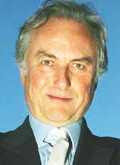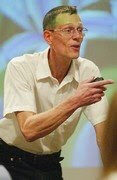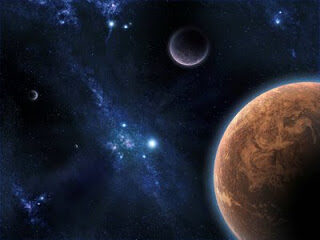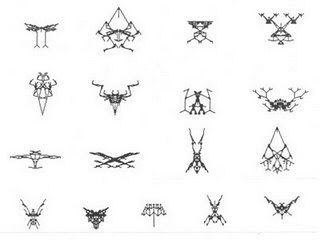“One of the most pernicious falsehoods
ever to be almost universally
accepted is that the scientific method
is the only reliable way to truth”1
-Professor Richard H. Bube, Stanford University
Yes my friends, I am pulling the following quotation out of the holster – again. Scott C. Todd, Department of Biology, Kansas State University wrote:
“Even if all the data pointed to an intelligent designer, such a hypothesis is excluded from science because it is not naturalistic.”2
I have found, via certain comments from our readership, that Scott C. Todd’s statement tends to be shrugged of as being somewhat to the extreme. However, the more I thought of it the more I wondered if he was not, after all, accurately describing the point of view of a certain school of science and or atheistic activism. But let us engage in a bit of a circumlocution, then review the context of Todd’s statements and finally consider the greater subject at hand.
I am constantly astonished with how often and loudly atheist appeal to science (whatever that may mean to the individual at any given time) when seeking to support atheism and discredit theism. I am astonished because ultimately, science is of no advantage to atheists as implying their worldview. It seems as if in seeking science to be the all encompassing epistemic mode atheists are hoping that omni-science will become omniscience.
Perhaps atheists rely, or claim to rely, so heavily on science because Creationists and Intelligent Design (hereinafter C&ID) proponents have such a hard time applying the scientific method. For example, in a debate creationist Dr. Carl Wieland shrugged off the results of lab work that did not agree with his viewpoint by referred to “Simply going to laboratory setting, in a contrived laboratory setting…” to which Dr. Paul Willis, “Skeptic of the Year” recipient, retorted, “It’s valid in science, this is the best you can come to as far as experimental evidence is concerned. Surely, people should be commended for trying to emulate in a laboratory these sorts of things.”3
Oops, actually, I got that backwards: it was the atheist and alleged skeptic who besmirched the scientific method when the results did not fit his preconceived worldview and it was the Bible-thumping-fundamentalist-creationist who praised the method-who would’a’thunk’it?
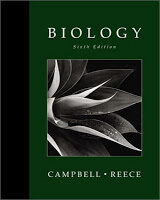
C&ID related issues have already made their way into the secular classroom yet, in the case of this example, not at the hands of C&ID proponents. The utterly secular and pro all things Darwinian college level textbook Biology by Neil Campbell and Jane Reece makes the following statement premised upon homology:
“Surely, the best way to construct the infrastructure of a bat’s wing is not also the best way to build a whale’s flipper. Such anatomical peculiarities make no sense if the structures are uniquely engineered and unrelated. A more likely explanation is that…all mammals [descend] from a common ancestor…The historical constraints of this retrofitting are evident in anatomical imperfections. For example, the human knee joint and spine were derived from ancestral structures that supported four-legged mammals. Almost none of us will reach old age without experiencing knee or back problems. If these structures had first taken form specifically to support our bipedal posture, we would expect them to be less subject to injury.”4
This argument, and its tone, is not worthy of important debates such as those related to C&ID issue. Moreover, it is certainly not worthy a textbook that sells for hundreds of dollars nor of the class in which it is taught that costs thousands of dollars spent by someone who wants to learn biology and not necessarily join the C&ID fray.There are a few points to make here. Notice the pushy tone implied in the terms “surely,” and the affirmative terms “make no sense” and “more likely.” Keep in mind this is not an anonymous posting on the internet, this is you and your (or you parent’s) hard earned money sitting before a brilliant professor. Instantly you understand that to disagree would be foolhardy and nonsensical, it would be to negate the “more likely” explanation.
References to the concepts of creation or design are implied in the terms “construct,” “build” and “engineered.” The reason that this is so clearly a very poor arguments is that according to it I should file a lawsuit against the company that claims to have designed/engineered my car since they obviously did not design/engineer my car. Why do I think that they did not do so? Because the fact is that even the best designed/engineered car will suffer from accidents as well as wear and tear. Since my car not only requires regular maintenance but is becoming un-drivable it must not have been designed/engineered but evolved from a three, two or one wheeled vehicle which in turn evolved from smooth rounded river rocks.
I wonder if in science atheism is not seeking its own secular faith. After all, under the generic term “science” we find somewhat of a grab-bag-like concoction of actual observation and reproducible experiments but also theorizing to the point of mythologizing, fallaciously far-reaching inferences, subjective interpretations, etc. Is atheism perhaps seeking an arcane and enlightened priesthood of scientists? Is atheism therefore willing to accept scientific claims that are against common sense, as if by secular-faith? Are they accepting arguments from authority? And do the activist coenobitical scientists exploit their authority as experts? I certainly can merely speculate. Yet, there are a few personages who have stated their opinions on these matters; the ones that I will quote here are Stephen Jay Gould, Richard Lewontin and proof of accepting an argument from authority even while besmirching others who do the same, by Christopher Hitchens.
The late Stephen Jay Gould; who was a teacher of biology, geology and history of science at Harvard University:
“Science…is supposed to be an objective enterprise, with common criteria of procedure and standards of evidence that should lead all people of good will to accept a documented conclusion…But I would reject any claim that personal preference, the root of aesthetic judgment, does not play a key role in science…our ways of learning about the world are strongly influenced by the social preconceptions and biased modes of thinking that each scientist must apply to any problem. The stereotype of a fully rational and objective ‘scientific method,’ with individual scientists as logical (and interchangeable) robots, is self-serving mythology. Historians and philosophers of science often make a distinction between the logic and psychologic of a scientific conclusion-or ‘context of justification’ and ‘context of discovery’ in the jargon…The myth of a separate mode based on rigorous objectivity and arcane, largely mathematical knowledge, vouchsafed only to the initiated, may provide some immediate benefits in bamboozling a public to regard us as a new priesthood, but must ultimately prove harmful in erecting barriers to truly friendly understanding and in falsely persuading so many students that science lies beyond their capabilities…the myth of an arcane and enlightened priesthood of scientists….T.S. Kuhn referred to the shared worldview of scientists as a paradigm (see his classic 1962 book, The Structure of Scientific Revolutions). Such paradigms, in Kuhn’s view, are so constraining, and so unbreakable in their own terms, that fundamentally new theories must be imported from elsewhere (insights of other disciplines, conscious radicalism of young rebels within a field) and must then triumph by rapid replacement (scientific revolution), rather than by incremental advance.”5
Professor of zoology and biology at Harvard University, Richard Lewontin, wrote:
“…scientists transgress the bounds of their own specialty they have no choice but to accept the claims of authority, even though they do not know how solid the grounds of those claims may be. Who am I to believe about quantum physics if not Steven Weinberg, or about the solar system if not Carl Sagan? What worries me is that they may believe what Dawkins and Wilson tell them about evolution…In the end we must trust the experts and they, in turn, exploit their authority as experts and their rhetorical skills to secure our attention and our belief in things that we do not really understand.”6
In my essay The Quadripartite Equine Riders I critiqued a discussion between Daniel Dennett, Christopher Hitchens, Richard Dawkins and Sam Harris. One issue that they discussed was that of authoritarianism in science (see my section entitled “On Scientific Authoritarian Faith”). For our purposes here, I wished to quote Mr. Hitchens:
“I’ll take things you [Daniel Dennett] and Richard [Dawkins] say on the human and natural sciences, not without wanting to check, but I’m often unable to but knowing that you are the sort of gentlemen who would have checked. If you say, ‘the bishop told me it so I believe it’ you make a fool of yourself it seems to me, and one is entitled to say so.”
May we likewise state, “If you say, ‘the scientists tell me it so I believe it’ you make a fool of yourself it seems to me, and one is entitled to say so”?
Next, let us consider Scott C. Todd’s statements in greater detail.
Firstly, let us note that Todd’s statements are actually very well balanced for the most part. He does, as many do, confuse Creationism with Intelligent Design but does make some very valid points such as:
“Creationists, according to [Philip] Johnson, do not doubt that DNA encodes the features of an organism or that changes in DNA (mutations) give rise to variation in those features which are subject to selective pressures in nature. Mainstream creationists also accept that genetic and phenotypic changes could result in speciation. They consider evolution as a plausible model to account for the natural history of living things, but they see a great distinction between the empirically proven elements of evolution (micro-evolution) and the explanation of speciation and origins of life (macro-evolution).”
He then advises:
“…science educators everywhere must do a better job of teaching evolution. It must be made clear that the evidence supporting the mechanism of evolution is empirical and proven, but that speciation and natural history are derived from the admittedly weaker evidence of observation. The fact that one cannot reproduce the experiment does not diminish the validity of macro-evolution…one must question the interpretations of the observed phenomena and discuss the weaknesses of the model.”
Lastly, he states:
“Most important, it should be made clear in the classroom that science, including evolution, has not disproved God’s existence because it cannot be allowed to consider it (presumably). Even if all the data point to an intelligent designer, such an hypothesis is excluded from science because it is not naturalistic. Of course the scientist, as an individual, is free to embrace a reality that transcends naturalism.”
I thought to draw out Todd’s comments since from what I understand, having studied Darwinian evolution for over a dozen years, he actually makes very valid points. Incidentally, I would imagine that the overwhelming majority of C&ID proponents have studied it for a minimum of a dozen years.
C&ID are neither anti-science nor anti-evolution but only anti-having-overreaching-speculation-being-passed-off-as-empirical-science. This may seem very basic but it is very, very important to note: C&ID proponents are perfectly willing to accept evidence but cautious, to the point of rejection, of speculation (speculation being what it is, a mixture of observation and opinion, interpretation or schools of thought).
Imagine that, C&ID proponents interested in actual scientific evidence, who would’a’thunk’it? I jest slightly since I am aware that many believe that it is not so cut and dry since they consider that C&ID are actually ignoring or manipulating certain evidences (to which C&ID would surely retort, “Ditto”).
Moreover, certain scientists, such as Prof. Dawkins, do not agree that “evolution, has not disproved God’s existence” nor that “it cannot be allowed to consider it (presumably)” and while Prof. Dawkins may, when pressed, agree that “the scientist, as an individual, is free to embrace a reality that transcends naturalism” he certainly belittles them for doing so, not only as individuals but as thinkers and as scientists. Prof. Dawkins actually goes as far as to refer to certain scientists as belonging to, “the Neville Chamberlain school of evolutionists.” Chamberlain is most well known for his attempt to avoid war with Hitler by means of appeasement. Prof. Dawkins makes particular reference to scientists (the philosopher of science Michael Ruse in this case) who stated that evolutionists “must realize that the enemy of our enemies is our friend. Too often evolutionists spend time insulting would-be allies…Atheists spend more time running down sympathetic Christians than they do countering creationists.”7 These sorts of statements Prof. Dawkins likens to appeasing Hitler. But what do these evolutionists betray? Actual science or his atheistic worldview?
This question brings us to the “schools of thought” to which I referred as well as the question of “science or activism.” Certain scientists such as Prof. Dawkins, William Provine, et al, infer much more from their studies and observations than surely anyone could logically infer, certainly much more than what they are observing implies. They, being both scientists and activists for their particular worldviews, employ certain aspects of Darwinian evolution as a backdoor way to push atheism into the classrooms.
What Todd seemed to be getting at in his statement, “it cannot be allowed to consider it (presumably)” is an interesting fallacy that certain atheists commit: first they will claim that science does not deal with the supernatural and then claim that science disproves the supernatural. But how would it, or could it, disprove something with which it does not deal? It does not. However, these certain atheists would tell you that science disproves the supernatural by discovering evidence of how things, the universe, the earth, life and everything, can come about by purely materialistic processes. Of course, science has done no such thing with regards to anything much less everything. Science has discovered how certain preexisting things function, period. We may be able to tell how an organism proceeded forth from a previously existing organism but not how all organisms originated in the first place. We may have discovered that the universe had a beginning but not how it came to be, what banged? What, if anything, was there before the bang? Etc.
As an aside to the interested reader I wish to point out two essays:
Cosmology, Part I: Atheists and Scientists Avoid the Pre Big Bang Scenario at All Cost
Cosmology, Part II: Book, Chapter and Multi-Verse
To the issue of life’s origins: yes, there are various failed speculations (some which are enumerated here). I am personally a bit torn on this issue since on the one hand, materialistic-scientific attempts to reproduce life from non-life are failing like so many ducks being shot in a row. In this case materialistic-scientific may finally punch itself out even while shadow boxing, ultimately proving itself incapable of producing anything within the realm of observation or reproducible experimentation. On the other hand, if life ever is produced from non-life in a laboratory I am afraid that it will not be evidence for how life originated but will only be able to point to the realm of could have/might have. Moreover, any such successful experiment will, in reality, only prove intelligent design.
Why is this? Because the experiment would require a team of trained scientists who will utilize their highly intelligent brains to design an experiment that will employ their specialized education. They will utilize laboratory equipment that was designed by very intelligent and specifically educated engineers. They will combine preexisting organic matter that will be consciously manipulated within a designed and purposefully controlled environment and with a specific result in mind. Thus, all that they will ever prove is that a group of scientists can make something do something.
In my essay, The Wizard of Biomorph Land I pointed out that Prof. Dawkins believes that he demonstrated materialistic-evolution utilizing a computer program. However, Prof. Dawkins wrote the program and so he is the creator god of his “biomorphs,” “my” as he calls them. He created a world, its laws/rules, and its life. His chosen ones were selected for further evolution, a process that the creator manipulated towards his ends since he knows the beginning and the end. He even admits that the biomorphs were predestined, “There is a definite set of biomorphs, each permanently sitting in its own unique place in a mathematical space.”8 He inferences materialism even while he denies, or fails to see, evidence of intelligent design when he, himself, played the part of intelligent designer.
Prof. Dawkins’ creations: the Biomorphs
Now a comment on the statements such as “Even if all the data pointed to an intelligent designer, such a hypothesis is excluded from science because it is not naturalistic.” Again, scientists such as Prof. Dawkins reject the concept that science does not, or cannot, deal with the supernatural. Yet, at the moment this seems mere semantics. If ever “all the data” (whatever “all” may mean, “all” is a very tall order) “pointed to an intelligent designer” surely science itself would evolve in order to accommodate the study of such a designer. I fully know that many of the readership will respond with words to the effect of, “Certainly, and we will change our worldview to fit the evidence that comes to light at such a time.” Fair enough.
However, this does bring up the issue of certain people putting far too much trust and faith in “science” whatever that may mean to them at any given time. In fact, Prof. Dawkins urged little unsuspecting children thusly, “Put your trust in the scientific method, put your faith in scientific method.”9 Some people, such as Stephen Jay Gould and Prof. Dawkins, have taken a method which was meant to observe and experiment and turned it into a catechism for the materialistic worldview and lifestyle.
Yet, the evidence gained from the scientific method is one sort of evidence and does not amount to the alpha and omega of episteme. Unless you are quite pleased to revise your whole worldview, or significant portions of it, on a semi-regular basis then you should never base your beliefs, your worldview, or lifestyle on science. Firstly, because science is mere tiny portion of the stuff of life. Secondly, because science does not deal with truth but seeks to ascertain the best guesses we have thus far and it is therefore necessarily tentative. Attempt, just for a moment to seriously consider studying biology and inferring that no god(s) exists anywhere inside, outside or in betwixt the universe and you will readily detect the fallacy.
It appears to me that so many atheists rely on science both for attempts at validation of their worldview and refutation of those worldviews with which they disagree due to their own brand of faith. This faith is not like the biblical faith which basically means drawing a logical inference but a faith which is a crossed fingered hope that somehow the absolutely materialistic worldview will be validated. I have previously posted an essay entitled Look Both Ways Two Atheistic Logical Fallacies the point of which was to categorize two basic fallacies which I termed: the fallacy of validation by projection and the fallacy of validation by regression. To quote from that essay, the point was, in part, as follows:
“In order to validate their beliefs atheists look both ways, up and down, the corridors of time-to the inaccessible past and future. When, for example, atheists appeal to quaint Victorian era concepts of abiogenesis in order to explain life’s conception they must deal with the fact that abiogenesis (abiotic synthesis) is not observed anywhere and is not producible in any experiments. What is their answer? They can imagine a time, long, long ago in the Earth’s past, when everything happened just so and abiogenesis was possible. What about filling the various gaps in our knowledge? They can imagine a time in the distant future when their beliefs will be proven true. Thus, atheism is validated by projection and regression. Herein lies the fallacies: they merely regress to an unknown past in which they can imagine thing occurring that do not occur today and they can project into an equally unknown future at which time we will discover that absolute materialism is true. As long as they can imagine it, it must be true.”
According to this worldview the supernatural is simply impossible. If ever evidence was uncovered of the supernatural the response would simply be that once our understanding of natural causes increases surely such an alleged supernatural event will be explainable through materialistic means. Therefore, we can know that there is no supernatural realm because there is no evidence for a supernatural realm and there is no evidence for a supernatural realm because we know that there is no supernatural realm.
Thus, this worldview is gap filler that allows the atheist to fill the gaps in our knowledge with time, chance, matter, luck, imagination and their brand of faith (I have detailed this in my essay The Gap Filler). This, it seems to me after some musing, is what Prof. Dawkins refers to as being an intellectually satisfied atheist: it means that he is quite satisfied concocting tales about how things could have occurred materialistically. And as long as he can concoct such a tale then that is good enough. Thus, Prof. Dawkins can declare that life originated by “luck” and be quite pleased to have merely employed the secular equivalent of “miracle.”
Lastly, I wish to point out that Prof. Lewontin, has stated in no uncertain terms that in the sciences the case is not only that evidence derived at by pure unbiased observation is then interpreted materialistically, or manipulated to fit a materialistic mold, but that the system is premised upon deriving materialistic results:
“Our willingness to accept scientific claims that are against common sense is the key to an understanding of the real struggle between science and the supernatural. We take the side of science in spite of the patent absurdity of some of its constructs, in spite of its failure to fulfill many of its extravagant promises of health and life, in spite of the tolerance of the scientific community for unsubstantiated just-so stories, because we have a prior commitment, a commitment to materialism. It is not that the methods and institutions of science somehow compel us to accept a material explanation of the phenomenal world, but, on the contrary, that we are forced by our a priori adherence to material causes to create an apparatus of investigation and a set of concepts that produce material explanations, no matter how counter-intuitive, no matter how mystifying to the uninitiated. Moreover, that materialism is absolute, for we cannot allow a Divine Foot in the door. The eminent Kant scholar Lewis Beck used to say that anyone who could believe in God could believe in anything. To appeal to an omnipotent deity is to allow that at any moment the regularities of nature may be ruptured, that miracles may happen.”10 [italics in original, bold mine]
~~~~~~~~~~~~~~~~~~~~~~~~
A plea: I have to pay for server usage and have made all content on this website free and always will. I support my family on one income and do research, writing, videos, etc. as a hobby. If you can even spare $1.00 as a donation, please do so: it may not seem like much but if each person reading this would do so, even every now and then, it would add up and really, really help. Here is my donate/paypal page.
Due to robo-spaming, I had to close the comment sections. However, you can comment on my Facebook page and/or on my Google+ page. You can also use the “Share / Save” button below this post.




